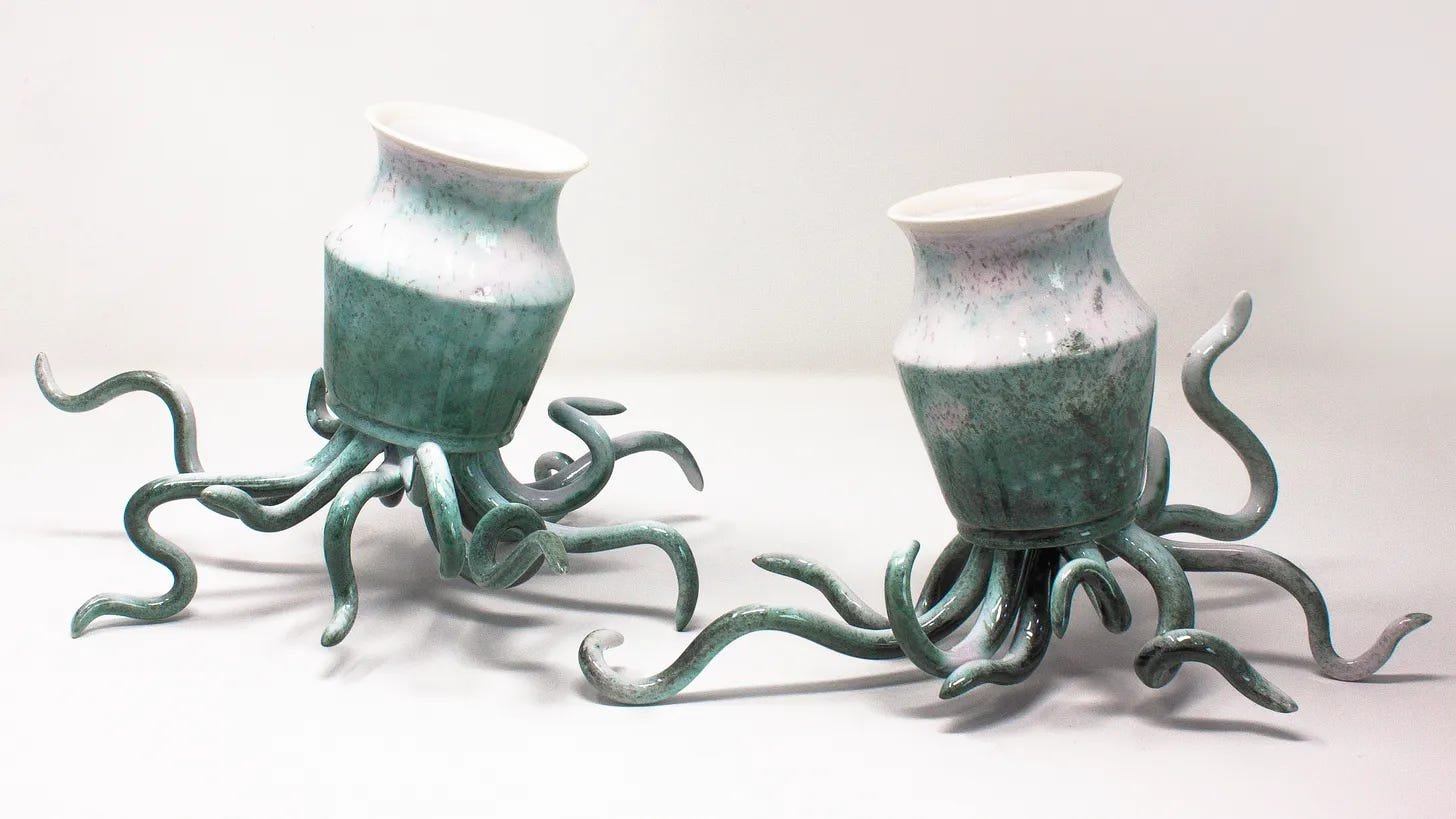cailloux n°113
exil et mouvement



Rose Schmits est une céramiste qui produit des Crawler pots ; vases, tasses et théières dont émergent des appendices étranges, tentacules ou arthropodes, couverts d’émaux aux teintes délicates. Ici, elle parle de son processus de création et de la façon dont ce projet évoque l’être trans et le processus de transition.
I liked the idea of these pots as having outgrown their time as a stationary pot and have sprouted appendages to roam around. I think of the tentacles and crab legs as though they have grown out of the base of the pot, a body changed and demanding autonomy.
To me this project is inherently trans. It may not be as direct and clear-cut as some of my other work which references transness in very direct ways often even putting ‘trans’ right on the pot in words. The crawler pots are more conceptually trans. They’re all about changing bodies, different bodies and the subversion of what a body can look like and be.
[…]
There is an element of body horror to the vessels, they look like they squirm and scuttle, and if you have a phobia of octopuses and/or crabs/spiders they may send a slight chill down your spine. But I invite you to find the beauty in their strangeness.
*
Je n’ai jamais joué à Shadow of the Colossus mais j’ai malgré tout aimé cette critique d’Alex MacFadyen (datant de 2012) car moi non plus, je n’aime pas bien tuer les monstres dans les jeux vidéos.
Despite hearing great things about Colossus, I resisted playing it at first because I always feel apprehensive about a game that involves slaying monsters. I identify with their liminality. It’s hard for me to want to kill monsters when they’re so often a metaphor for outsiders, freaks, and anyone or anything different. I’m not a big Disney fan, but one thing that stuck with me was the angry mob in Beauty and the Beast singing “We don’t like / what we don’t understand / In fact it scares us / And this monster is mysterious at least.” In that context, monster slaying is ultimately a manifestation of xenophobia.
[…]
In a game like Colossus, the emphasis on the emotional experience allows for moral ambiguity and complexity. The Colossi are beautiful and impressive creatures. You find them in repose or roaming around, and there is no sense that they are doing any particular harm. I can’t recall any narrative about what they’ve done or what threat they pose to explain why you are killing them, just that it’s necessary for them to die in order to restore life to the girl. They seem to understand that you’re there to kill them and they defend themselves against you, but there’s no sense of hostility about it on either side. Vanquishing them seems like an obligatory task for which the hero pays a price, rather than the traditional genre convention of a victory to rejoice in.
*
Et puis, ce très beau texte de Wiam El-Tamami, sur ses souvenirs – et ceux de sa famille – de l’invasion du Koweït par l’Irak alors qu’elle était enfant.
That first morning, my father says, I left home and headed to the hospital as usual. I didn’t realize what was happening. I had heard some noises, distant gunshots. I was surprised to see troops, rows of tanks. The soldiers had machine guns and were shooting into the air. There were people all around, just normal people in their cars, heading to work. I thought: Are they crazy, shooting their guns with people around like that? I thought it was a military drill. I didn’t realize they were Iraqi troops.
When I got to the hospital, I walked in through the Accident and Emergency entrance, and all the other doctors were standing there, clustered around. They turned to me and said: Iraq has invaded.
Just like that. Iraq invaded Kuwait.
*
Une photo de Makhlouf, « pour la mettre sur son cœur ». Ça, cette parole rapportée de son père, mon père me la dit en arabe. C’est en arabe qu’elle a été prononcée ; c’est en arabe qu’il la répète… avant de s’interrompre d’une voix étranglée. Je le regarde et ses yeux sont pleins de larmes. Je vois très bien que ça le tue de penser que son père est mort avec une photo de lui sur le cœur (comme si ça le tuait de penser que son père ne l’avait pas oublié). Quand mon père dit « Makhlouf » en reproduisant la voix de son père, on dirait qu’il parle de quelqu’un d’autre. Il y a une fragilité et une douceur dans la manière de prononcer le prénom qui est complètement étrangère à la personnalité combattive et endurcie de mon père. Il me dit : « Tu vois, je ne veux pas raconter ces choses-là, parce que je ne veux pas pleurer devant ma fille ». Il n’a jamais terminé l’histoire. Ça s’est fini abruptement sur ça, sur le fait qu’il ne pouvait pas en parler sans revivre une émotion déchirante. Déchirante et, manifestement, déplacée.
Épargnés par le marasme actuel des réseaux sociaux, il existe encore des blogs, certains laissés en friche depuis plusieurs années, d’autres mis à jour tout récemment – ce qui est plus rare. Je suis tombée par hasard sur ce post de blog, L’exil en héritage, de Margaux Merand, psychanalyste.
Pour finir, cette phrase :
Si on ne connaît pas l’expérience de l’exil directement – ce qui est mon cas –, on en hérite quand même (et on hérite de l’exil davantage que d’une culture vivante).









